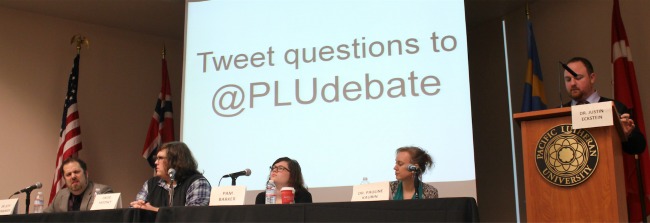Interactive debate on drone policy shifts audience opinions

“Is U.S. drone program fatally flawed?” This was the question debaters from Pacific Lutheran University (PLU) and University of Puget Sound (UPS) focused on during the first annual Ruth Anderson public debate on Wednesday, December 4. More than 100 people attended the debate on the PLU campus with more than 80 scoring the debate electronically.
Debate participants included Pauline Kaurin, Associate Professor of Philosophy at PLU, and Pam Barker PLU senior communication studies and political science major speaking for the affirmative; and Seth Weinberger, Associate Professor of Politics and Government at the UPS and David Mooney, PLU senior and political science major, arguing for the negative.
Much of the debate focused on the differing opinions regarding the human cost of drone attacks. The debate came down to the question of “What do you prefer fairness or efficiency?” The audience ultimately chose efficiency.
“I’m not surprised the debate turned out the way it did. In a lot of ways it mirrors the national discussion,” Justin Eckstein, Director of Forensics and Clinical Assistant Professor at PLU, said.
The debate was streamed via Lutecast, PLU’s streaming media service. Audience members both on campus and online were asked to weigh in electronically via text message and Twitter on the primary question both before and after the debate.
The results of the voting showed a shift in audience opinion about U.S. drone policy following the debate. Before the debate 33 audience members voted that the drone policy was fatally flawed, while 22 indicated that it wasn’t, and 27 remained undecided.
Following the debate the audience opinion shifted with 28 votes that the policy was fatally flawed, and 33 votes that it was not. In the end only five audience members remained undecided.
Amy Young, Associate Professor of Communication, tweeted, “If we will risk human lives when it matters, like Bin Laden, what does it say about counterterrorism that we are sending drones?” while Christian Dilworth asked via twitter, “How can you avoid civilian casualties if the targets are surrounded by civilians?”
“We had a wonderful turnout at the event,” Justin Eckstein, Director of Forensics and Clinical Assistant Professor at PLU, said. “I’m looking forward to hosting another debate in the future and continuing to generate participants from across campus and beyond.”
To watch the debate click here, and to see comments and questions raised during the event see twitter hashtag #dronedebate. This new public debate series was named for Ruth Anderson, a famous, former PLU debater. The next Ruth Anderson Public Debate will be in December 2014.



Social Media